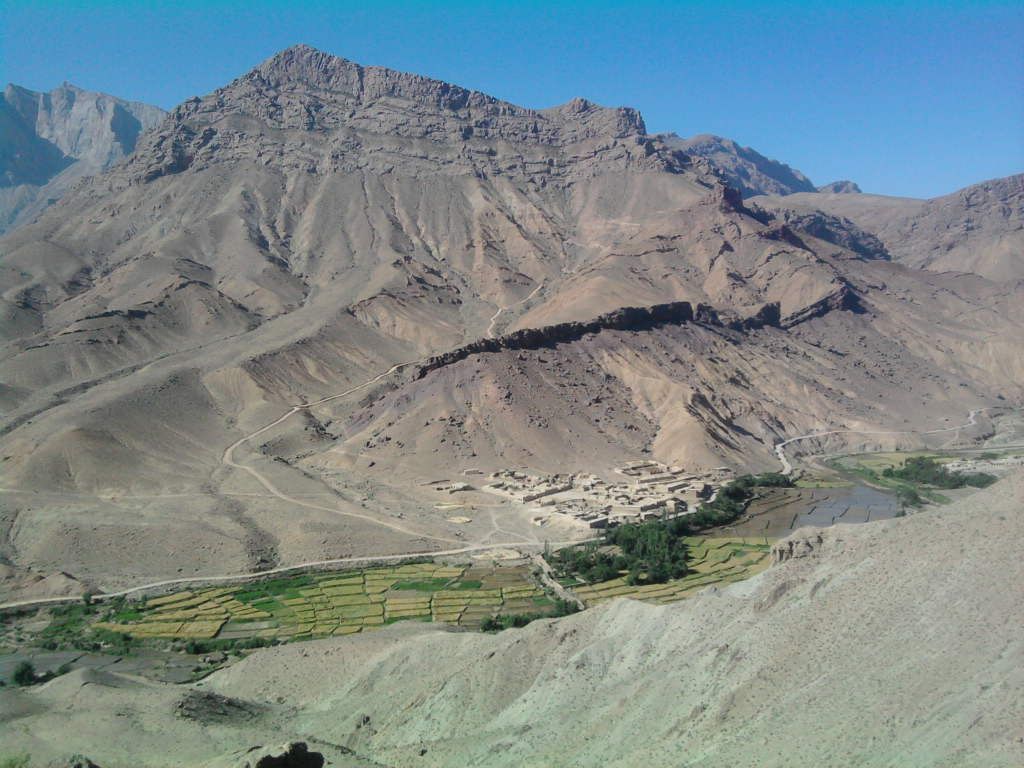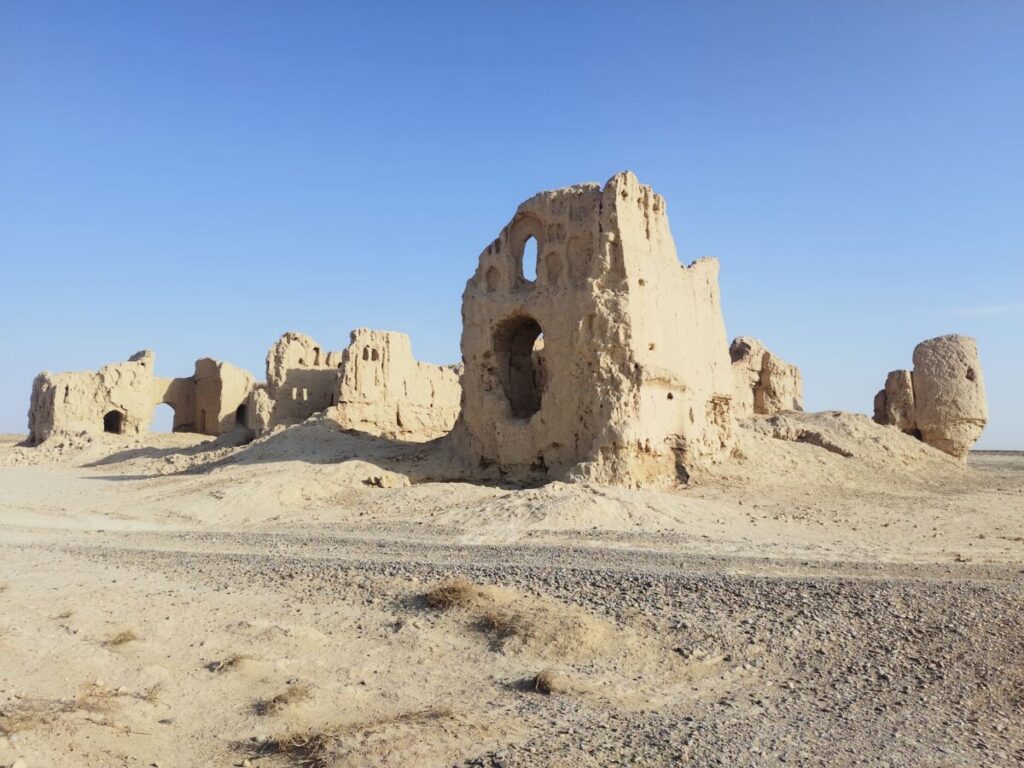Lashkargah (Kubha News)- James Peterson, a 45-year-old tourist from Northern Ireland, has come to Helmand Province to visit areas where his wife served as a member of the British forces between 2012 and 2014, and she had shared stories about its attractions with him.
James Peterson is a film director, and his films often focus on tribal rivalries and the backwardness of people in Africa.
Peterson explains that by hearing stories about Helmand from his wife Emilia and watching videos she sent him during her military mission, his mind became captivated, and he harbored a desire to one day see these attractions up close.
James says that his wife, by losing a limb in Helmand, turned Afghanistan into an eternal memory in the minds of their family: “My wife, Emilia, was sent to Helmand as a Royal Air Force soldier in 2012. While stationed at the military base in the Greshk district, Taliban attacked the base, and Emilia was injured during the conflict. With her hand severed, she returned to Ireland. Since then, our lives have changed, and our children, Julia and Kristen, suffered more psychological damage from this event than anyone else.”
James is not the only one whose memories and stories of the twenty-year war have drawn him to southern Afghanistan; according to officials of tourism and travel companies, most tourists coming from the West to Afghanistan prefer to visit areas that have been the scenes of the most intense battles and news headlines over the past twenty years, contrary to recreational places.
Hamed Saihoun, manager at Asmayee Tourist Company in Kabul’s Shahr-e Naw, says that his foreign customers are mostly tourists interested in visiting the south, especially areas where going there meant risking human life in the past twenty years: “Foreign archaeologists prefer to have official trips to historical and ancient sites, but the majority of foreign tourists are interested in traveling to areas that have witnessed war over the past twenty years, especially southern Afghanistan. Most of my clients prefer to visit Helmand, Ghazni, Tora Bora in Nangarhar, Seto Kandaw in Paktia, and Uruzgan Province.”
This year in the summer, the district of Zazi in Paktia Province witnessed a vibrant presence of Afghans and foreign tourists. This district, which was a site of heavy conflict after 2012 and lacked any facilities or infrastructure to accommodate tourists, its residents this year embracing hospitality and attracting more tourists than in previous years. Even foreign tourists were welcomed into the homes of locals for hospitality, due to lack of formal tourist facilities.
Shamel Zazai, a civil activist in the district of Zazi, Paktia, along with his young friends, has been striving to not only provide facilities for tourists but also to employ a team of educated youths as guides for foreign tourists.
“My wife, Emilia, was sent to Helmand as a Royal Air Force soldier in 2012. While stationed at the military base in the Greshk district, Taliban attacked the base, and Emilia was injured during the conflict. With her hand severed, she returned to Ireland. Since then, our lives have changed, and our children, Julia and Kristen, suffered more psychological damage from this event than anyone else.”
Mr. Zazai mentions that foreign tourists mostly arrived in the area with a mindset tainted by the ravages of war. However, when they witnessed the natural attractions of this district, they became enchanted by it: “When our guests arrived here, their first request was often to take them to Seto Kandaw to see the remnants of war. However, during the day, when we took them to the green and beautiful nature, and they saw enthusiastic young people playing volleyball in the green fields among pine nut trees, they became enchanted by it.”
Since the onset of internal conflicts and, subsequently, war and political instability in Afghanistan, fewer research have been conducted on the country’s regions and archaeological sites. Only a handful of ancient artifacts have been registered by UNESCO in the past twenty years.

Now, among tourists, foreign archaeologists are also interested in coming to Afghanistan to research well-preserved ancient artifacts amid the country’s crumbling state.
Reza Kadiopur, an Iranian archaeologist who visited Bamyan Province to see the Bamyan Buddhas, says that twenty-four years ago, upon hearing the news of the destruction of the Buddha statues in Bamyan, he became eager to travel to Afghanistan: “When I was a student of archaeology at the Faculty of Literature and Humanities at the University of Tehran in 2003, I read about the destruction of the Bamiyan Buddhas and their attractions in the university magazine. Since then, I have been very interested in Bamyan, but I never had the opportunity to visit in the past twenty years. Now, I have come here to write a thesis about the Bamyan statues. If the situation remains the same, I will bring my wife with me next year.”
The statues of the Buddhas of Bamyan, standing at heights of 55 and 35 meters, were carved in the 6th century AD and, according to the United Nations Educational, Scientific and Cultural Organization (UNESCO), were the tallest statues in the world.
These statues were detonated by explosives placed at their bases by the order of Mullah Mohammed Omar, the former leader of the Taliban, 24 years ago.
Now, the destroyed statues have become a lucrative source of income for the Taliban. According to Mohajer Farahi, deputy Ministry of Information and Culture of the Taliban government, in just six months during the spring and summer of 2023, between 40,000 to 50,000 foreign and domestic tourists visited Bamiyan. Four thousand two hundred of them were foreign tourists.
Tawfiq Atmar, a former employee of the Tourism Directorate of the Ministry of Information and Culture believes that alongside restrictions on women’s movement imposed by the Taliban, the limited number of professional tourism companies and facilities has caused that despite improved security, fewer tourists come to Afghanistan: “Tourists comes to Afghanistan with risks because countries whose citizens have the interest and financial means for tourism receive warnings from their governments that traveling to Afghanistan is risky. Another issue is the lack of facilities. The provinces that tourists are interested in visiting lack suitable transportation and accommodation facilities, and tourists have to travel to provinces in the morning and return to Kabul at night.”
Some Afghans believe that restrictions on women’s movement by the Taliban government have been more focused on Afghan women, while foreign women can travel freely in Afghanistan in any way they wish. However, sociologists believe that even if foreigners are exempt from these restrictions, foreign female tourists will never take this risk and will refrain from traveling to Afghanistan in the coming years.
Tahera Shinwari, a sociologist at Norway State University, believes that the security in Afghanistan implies the end of war, and families still do not have mental peace: “Most domestic tourists travel for recreation, but now families prefer to stay home because women are not allowed to go to recreational places, and family men used to travel to provinces in the past due to the entertainment and refreshment of their wives and children. Now, with increased restrictions on women, not only women but all members of families have been deprived of outings.”
The tourism industry has been one of the significant revenue sources for countries, especially Central Asian countries neighboring Afghanistan annually earn millions of dollars.
However, in Afghanistan, governments and private tourism companies have invested less in the growth of this industry, and due to the lack of facilities, most foreign tourists refrain from visiting Afghanistan again once they come.
